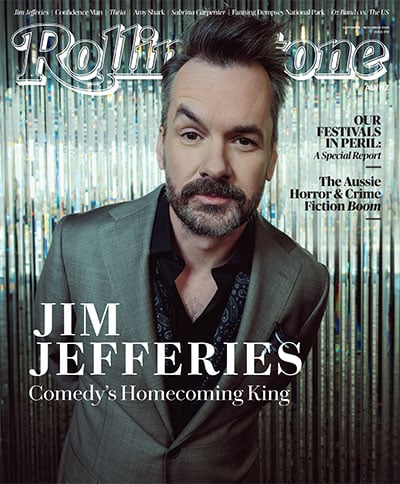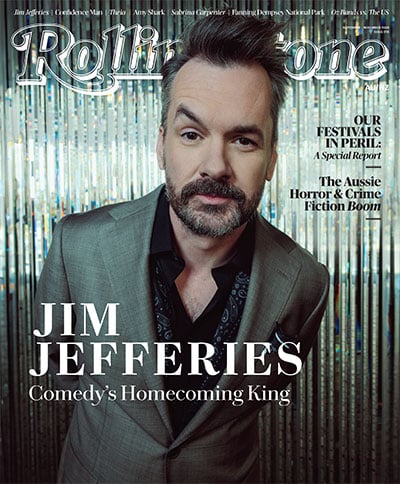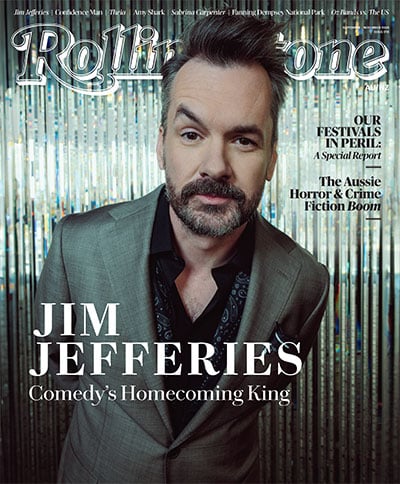Mark Alexander-Erber is playing a game of rock and roll roulette.
The fifty-four-year-old is the ultimate music industry cliche. He collects vintage cars (“Old Porsches and Ferraris, mostly”), rides motorcycles (“Harley’s and Indians, only”) and listens to rock music on repeat (“AC/DC got me through my parent’s divorce”).
He’s also a visionary, betting big on a looming rock and roll renaissance — the likes of which haven’t been seen since the Eighties or Nineties. And when that resurgence finally reaches the masses, Alexander-Erber appears better prepared than most to lead its rebirth.
He already has more than ten independent record labels around the world under his Golden Robot Global Entertainment Group, which he says is shaping up to be his best investment yet. Alexander-Erber, using his own piggybank and with the help of an unnamed “Sydney-based family”, has already put millions of dollars into it.
“Something like $15 million so far,” he tells Rolling Stone over Zoom.
Just as he finishes that draw-dropping sentence (“I probably spent too much money in the early days which caused headaches,” he adds), a black cat strolls across his desk. It sends the screen into total darkness. It’s just enough time to draw a breath while trying to discern if the black cat is a good omen or a bad omen, or just plain happenstance. Google suggests all three are possible.
The Australian entrepreneur — who first made a name for himself with his hotel chain The Pubboy Group in the early Naughties — made him good tabloid fodder at the time. The Sydney Morning Herald once referred to him as a “tattooed motorcycle-riding entrepreneur” and the “tattooed millionaire scrapheap” as it reported on his business highs and lows, links to bikers, high-profile divorces, and even a girlfriend with royal ties.
“My love for rock and roll has been there my whole life,” he says. “I had a pub in Australia called the Iron Duke that was known as really the CBGB’s of Sydney. It was very well known. We had bands like Magic Dirt, Eskimo Joe, the Deftones play there. The Helicopters played there. Fu Manchu played there. All these great bands, these great Aussie bands got their start at Iron Duke. I remember Eskimo Joe on a Tuesday night playing to seven people.”
After the eventual demise of The Pubboy Group came a few more entrepreneurial pursuits, mostly on Sydney’s controversial and colourful Kings Cross strip. “I ended buying Coluzzi Cafe with Rodney Adler and then opened a kabab shop up there, and then a tattoo parlour,” he says. “It’s just another chapter in my book. I don’t necessarily think I’ve made mistakes. I’ve learned from experiences. The one thing that I’ve had the whole way is the ability to always believe in myself and back myself, no matter what.”
Alexander-Erber paints a self-portrait of “a colourful character”, but says the ego of his younger years hasn’t followed him into his fifties. “Through the pub days, when I was in my early thirties and making money, all I cared about was getting on the BRW Young Rich List. That was all part of being young and having an ego.” But those days are in the past. “I’m the complete opposite now. I wear my heart on my sleeve. I put my money where my mouth is.”
It was his drummer prodigy son, Jagger Alexander-Erber, from his first marriage, that inspired a move into the dog-eat-cat business of music. Like his father, Jagger (named, of course, after rock legend and Rolling Stones frontman Mick Jagger) also isn’t shy of attention. He first picked up a set of sticks at age five, and by nine he was thrust onto Australia’s Got Talent. He then became the youngest person ever to earn an endorsement from DW Drums.
“At a very young age, Jagger was one of the best drummers in Australia. I thought, ‘Well, I don’t want this kid to be a novelty. I’d like him to have some sort of a legacy.’ So I put him together with some older, wiser players and members of Noiseworks and other bands from around Australia, and they went into the studio and made a great album.” Album “The Orbitor” by Moon became the first release under Alexander-Erber’s first label, Golden Robot Records in 2015.
“Well, let’s not have one label. Let’s have multiple labels,” he says. “And now we’ve ended up with 12 record labels and just under 500 bands worldwide.”
The second label to join the fold, Social Family Records (which he purchased with a suitcase full of cash that he rolled into his lawyer’s office), was a rock and country label that helped launched the career of Fanny Lumsden (where she scored her first ARIA nomination for Small Town Big Shot in 2015), and revived the career of Nineties icons Baby Animals (who found their way back on the charts after a twenty-year hiatus with This Is Not The End in 2013).
In true Mark Alexander-Erber fashion, Golden Robot Records and Social Family Records were only the beginning. The new-found music mogul is sidestepping the industry’s old guard (“Sadly, all the main players are passing away,” he says) and building a new-world empire (“A fucking behemoth,” as he puts it), and not just in Australia. Golden Robot has quietly gone global in recent years.
“It’s just such a great business to be in,” he tells Rolling Stone. “If I had a dollar for every time someone said, ‘You’re like Interscope Records’, you’d be driving two Ferraris.”
Bread & Butter Records is Golden Robot’s artist development label, signing hot bands mostly from the U.K. and Europe. X-Ray Records is its digital distribution arm, for bands that “don’t want big deals”. Crusader is its metal label. Riot Records is its punk label. And Yama Records is its first foray into pop (“It’s a deal that I’ve done with Hot Chelle Rae,” he points out). Counter Clockwise Records is an alternative label started with his son, Jagger, who now works in the company. And the most recent addition to Golden Robot is Archangel Records, dedicated to “empowering female artists” and led by two new executives within the business.
Across all the labels, there’s an impressive roster, too many to list and not a single one that the unlikely music executive is prepared to brand his favourite signing.
“I loved the early days, signing Rose Tattoo and then being involved with Mi-Sex and The Superjesus on Social Family. All those Aussie bands that you grew up with were super cool. But we just signed Brett Scallion from Fuel. He’s got a new band called Melody Brothers.
“Filter, I’ve been stoked with. Having L.A. Guns, Faster Pussycat, Ratt, which is Steve Pearcy’s band, is amazing. Devo I’ve signed. The Answer has been great. They’ve got a new album coming up. I’m loving working with people like Nick Barker because I grew up with artists like Nick and I love his music. Johnny Casino, Steve Kilbey, Mark of Cain, all that great Aussie stuff.”
Now all that’s needed is the long overdue rebirth of rock and roll that Mark Alexander-Erber has placed his best bets on, despite the odds stacked against him by radio programmers and playlist tastemakers. It’ll be a return to the golden years, he says with absolute confidence.
“Rock was born properly in the Sixties and Seventies by Zeppelin and the Stones, but it’s needed a couple of heart jump starts over the years — and few blood transfusions. But I’m confident that we have spent the last few years giving it the resuscitation it needed. Now it’s tougher than ever, but by 2024 it will be as strong as it was In 1971.”






































